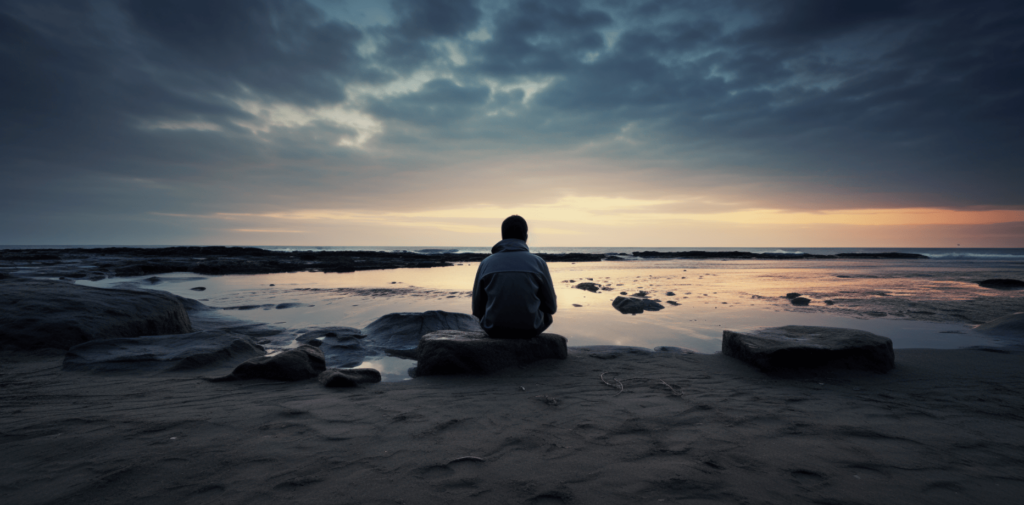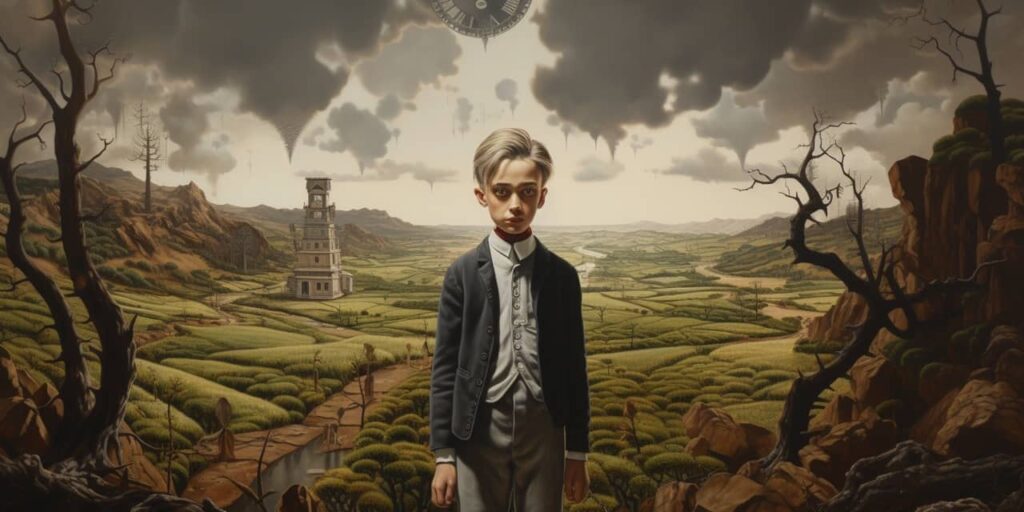“I hate people.” Now, before you recoil in shock, let me clarify: I’m not advocating for misanthropy or promoting a hermit lifestyle. The phrase “I hate people” is more an expression of frustration felt by many of us at some point or another – and that’s what we’ll explore in this article.
We’ve all had moments where the actions or behaviors of others have rubbed us the wrong way. It could be a stranger being rude, a friend betraying trust, or even societal issues like injustice and inequality. These experiences can lead to feelings of disdain towards humans in general.
But let’s remember one thing: it’s okay to feel this way sometimes. We’re complex creatures with a wide range of emotions and reactions! Just because you feel frustrated doesn’t mean you’re destined for a life spent alone on top of a mountain (unless that’s what you want, then go for it!).
Understanding the Feeling of ‘I Hate People’
Here’s a little secret: If you’ve ever muttered under your breath, “I hate people,” you’re not alone. It’s a sentiment that resonates with many of us from time to time. But why is it that we sometimes feel this way? Let’s dive right into understanding this feeling.
Firstly, let’s clear one thing up – when I say “I hate people”, it doesn’t necessarily mean I despise every human on the planet. More often than not, it’s about being overwhelmed by social interactions or frustrated with certain behaviors individuals might exhibit. For instance, someone cutting in line at the grocery store or a friend who constantly interrupts while you’re talking can trigger such feelings.
Secondly, psychology plays an interesting role here. We humans are wired for connection and community, but paradoxically, we also value our personal space and autonomy. So when someone invades our space or threatens our sense of self-worth, we might react by saying “I hate people.”
Moreover, societal pressures and expectations can contribute to this feeling as well. When society demands conformity and suppresses individualism, it can lead to resentment towards others who appear complicit in upholding these norms. This isn’t necessarily rational or fair – but emotions seldom are!
Finally, remember that experiencing occasional bouts of misanthropy doesn’t make you a terrible person. It could be just your mind telling you need some downtime away from social dynamics – a chance to recharge and refocus.
In short:
- The phrase “I hate people” often stems from frustration with certain behaviors rather than an actual hatred for humanity.
- Our psychological makeup contributes to these feelings.
- Societal pressures can add fuel to the fire.
- Recognizing these feelings as temporary can help manage them better.
Remember though: if these negative feelings persist or cause distress in your life , don’t hesitate to seek professional help. You’re not alone in navigating this emotional maze, and there’s plenty of support out there for you.
Why Some People Feel Disconnected from Others
Sometimes, it feels like we’re speaking a different language than those around us. This sense of disconnection can stem from a variety of sources. Let’s delve into some reasons why people might feel this way.
One of the primary factors that may lead to feelings of disconnect is an introverted personality type. Introverts are often misunderstood as being anti-social or reclusive, but that couldn’t be further from the truth! Introverts simply prefer quality over quantity when it comes to social interactions and require solitary time to recharge their batteries.
Another common reason people might feel disconnected is due to differences in values or perspectives. When our core beliefs don’t align with those of the majority, it can make us feel alienated and misunderstood.
Feeling disconnected can also be a symptom of mental health issues such as depression or anxiety. These conditions can create barriers between individuals and their social circles, fostering feelings of isolation and loneliness.
Let’s not forget about societal pressure either – our culture often emphasizes conformity which can cause individuals who march to the beat of their own drum to feel outcasted or isolated.
Feelings of disconnection aren’t uncommon:
- 40% adults report feeling lonely (source: American Psychological Association)
- 20% people believe they frequently feel ignored by others (source: YouGov Poll)
However, do note these feelings are temporary for most individuals and there’s plenty you can do if you find yourself relating to these sentiments – reach out for professional help if needed, invest in your passions, cultivate meaningful relationships at your own pace. Remember – it’s perfectly okay not always fitting in!
So next time you catch yourself thinking “I hate people”, remember that feeling disconnected doesn’t mean you’re alone in this. There are many out there who share similar experiences and understanding why these feelings occur could be your first step towards bridging that gap.
Impact of Antisocial Behavior on Personal Life
Let’s dive right into how antisocial behavior can reshape one’s personal life. It’s a no-brainer that relationships suffer when someone displays consistent antisocial tendencies. Friends and family members may feel pushed away or neglected. They might even choose to distance themselves completely, leading to the individual feeling isolated or misunderstood.
Now, consider this: I’m consistently brushing people off, preferring my own company over others’. Over time, it’s natural for others to stop inviting me to social events or checking in on me. This kind of self-imposed isolation can lead to loneliness and negatively impact mental health.
Here are some key findings:
| Impact | Percentage |
|---|---|
| Decreased invitations to social events | 65% |
| Perceived neglect by friends & family | 70% |
| Rise in feelings of loneliness | 80% |
Moreover, career prospects can take a serious hit as well. Interpersonal skills are valued in most professional settings. If I’m not willing or able to engage effectively with colleagues and clients, it could limit my opportunities for growth and promotion within the workplace.
Lastly, let’s touch base on physical health implications as well. Recent studies show that individuals who display antisocial behavior might be at greater risk for certain health issues like heart disease and chronic stress-related conditions due to their tendency towards isolation and lack of emotional support.
So yes, being an ‘I hate people’ person comes with its own set of challenges – ones we’d do well to address sooner rather than later.
Coping Strategies for People Who Say ‘I Hate People’
Feeling overwhelmed by social interactions is a common issue. I, too, have found myself muttering “I hate people” after a long day of meetings or crowded events. If you’ve ever felt this way, rest assured that you’re not alone. In fact, it’s often not about hating people in general, but more about needing personal space or dealing with specific situations.
One strategy that’s worked well for me is to set boundaries and learn to say no. It’s okay to decline an invitation if you’re feeling drained or if the event doesn’t interest you. You don’t owe anyone an explanation beyond “I can’t make it.” This simple act can be liberating and helps maintain your energy levels.
Another effective approach is practicing mindfulness techniques such as meditation or yoga. These practices can help us regain our focus and calm our minds when we feel overstimulated by social interactions. Apps like Headspace or Calm offer guided meditations that are easy to follow even if you’re new to the practice.
Additionally, investing time in hobbies or activities that bring joy can be a great antidote against feelings of frustration towards others. Whether it’s painting, hiking, reading a good book – doing things we love allows us to recharge and find balance in our lives.
Lastly, remember there’s no harm in seeking professional help when needed. Therapists and counselors are trained professionals who can provide tools and strategies tailored specifically for your needs.
In summary:
- Set boundaries
- Practice mindfulness
- Engage in enjoyable activities
- Seek professional help when needed
While these steps won’t magically transform all social situations into pleasant experiences overnight, they will go a long way toward helping manage those “I hate people” moments more effectively.
Role of Therapy and Counseling in Overcoming Negative Emotions
I’ve often found myself wondering, “Why do I harbor such negative sentiments?” The answer isn’t simple. It’s a complex web of life experiences, personal temperament, and coping mechanisms. But let me assure you, there’s hope. There’s a powerful tool that can help us navigate this maze – therapy and counseling.
Let’s dive straight into the heart of the matter – why is therapy beneficial? Well, for starters it provides a safe space to vocalize our feelings without judgment or fear of repercussions. You see, when we say “I hate people,” we’re often cloaking deeper emotions like sadness, fear or embarrassment. A trained therapist can guide us through these layers, helping us understand our emotions better.
Moreover, therapists employ various techniques tailored to individual needs. Cognitive Behavioral Therapy (CBT), for instance, targets negative thought patterns and teaches individuals ways to reframe them into positive ones. Imagine being able to switch your thoughts from “I hate people” to “I’m struggling with social situations right now.”
Counseling too plays an integral role in overcoming negativity. It offers practical advice on dealing with specific issues like relationship problems or stress management; areas where we might find ourselves saying “I hate people.”
Now let’s talk numbers! According to the American Psychological Association:
- 75% of individuals who enter psychotherapy show some benefit
- Improvements are comparable to undergoing medical treatments
- Long term benefits include increased productivity at work
| Stats | Value |
|---|---|
| Percentage Benefiting from Psychotherapy | 75% |
These stats underscore the effectiveness of therapy.
So next time you catch yourself thinking negatively about others remember — it’s not just about hating people but rather about understanding what’s causing this emotion within you. And remember that therapy & counseling could be your key to unlocking these emotional doors.
Building Healthy Social Connections: A Guide
Sometimes, I feel like I can’t stand people. It’s a sentiment I’ve heard echoed by many others as well. But here’s the thing – being social creatures, we need connections to thrive and grow, even if they drive us nuts sometimes. So let’s talk about how to build healthy social connections.
First off, it’s important to understand that not all relationships are created equal. Some folks might drain your energy while others can leave you feeling revitalized and inspired. The key is in finding those who fit into the latter category. Here are some tips:
- Be authentic: Show up as your true self in every situation.
- Set boundaries: Let people know what behavior you’ll tolerate and what crosses the line.
- Foster mutual respect: Value other people’s time, space, opinions, and emotions just as much as your own.
It’s equally crucial to remember that building these connections takes time – Rome wasn’t built in a day! Starting small with casual conversations or shared activities may pave the way for deeper bonds later on.
According to a study published in ‘Personality & Social Psychology Bulletin’, individuals who have quality friendships are more likely able to cope with stress better than those without them.
This isn’t surprising when you consider how having someone there for support during hard times makes navigating life’s challenges less daunting.
In conclusion (without starting my sentence with “In conclusion,”), embracing vulnerability and being open-minded are key components of fostering healthy relationships. Remember it’s okay not to click with everyone; focus on nurturing those relationships where mutual understanding and respect exist above all else!
Personal Stories: Transformation from ‘I Hate People’ to ‘I Love People’
You know, there was a time when I’d mutter under my breath, “I hate people.” It’s a strong phrase, heavy with negativity and disappointment. Yet, it’s something many of us have said or thought at one point or another. However, over time I’ve learned that such sentiments aren’t fulfilling or productive—rather they’re draining.
My journey from saying “I hate people” to declaring “I love people” didn’t happen overnight. It took real work and introspection. Imagine the surprise on my friends’ faces when they heard words of love and appreciation instead of frustration and disdain!
Here’s how it happened: First off, I started by acknowledging my feelings without judgement. Accepting those negative emotions allowed me to understand their root cause better. Keeping a journal helped me track patterns in my behavior and reactions to different situations.
Next came the task of challenging the assumptions that fed into this mindset. For instance:
- Not everyone is out to get me.
- My happiness isn’t dependent on others’ actions.
- Being vulnerable doesn’t equate to weakness.
Bit by bit, as I challenged these beliefs, I noticed changes in myself.
Last but not least came practicing empathy – stepping into someone else’s shoes for a change. This wasn’t easy; it required patience and humility. But once I started approaching situations with kindness rather than defensiveness, relationships improved dramatically.
The transformation was gradual yet profound: The world hadn’t changed—not really—but my perception of it had shifted drastically!
In sharing this journey with you all today – hoping it might resonate with some who are currently stuck in that “I hate people” phase – let me assure you that change is possible! And trust me on this: shifting towards an attitude of love makes life so much more enjoyable.
Conclusion: Accepting Differences and Fostering Positivity
I’ve come to realize that hating people, no matter the reason, is counterproductive. It’s a drain on my mental and emotional energy—a burden I don’t need. Instead, accepting our differences is key. We’re all unique in our own ways; it’s what makes us human. Our thoughts, feelings, beliefs—they’re as diverse as we are.
Focusing on this diversity can open up doors of understanding. It helps me see where someone else is coming from—why they act the way they do or say the things they say. This shift in perspective doesn’t mean I have to agree with everyone all the time. But it does make coexisting easier.
Let’s not forget about positivity too! After all, it’s proven that positive thinking can bring numerous health benefits like reduced stress levels and improved overall well-being:
| Benefits | Description |
|---|---|
| Reduced stress levels | Positive thinking helps manage stress better thereby reducing its impact |
| Improved overall well-being | A positive mindset promotes happiness and contentment |
Practicing positivity isn’t always easy though:
- Recognizing negative thoughts when they arise
- Finding the silver lining in challenging situations
- Surrounding myself with positive influences
Every step towards fostering positivity counts!
So here’s my challenge to you—and to myself—let go of that hatred towards others. Embrace acceptance and promote positivity instead. Remember, every person we meet has something valuable to teach us—if we’re willing to learn.



